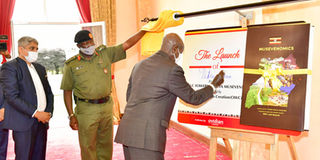Covid-19: Government spending drops

President Museveni (right) at the 58th Independence Day celebrations at Entebbe last Friday. Government expenditure has reduced due to the effects of Covid-19. PHOTO/ PPU
What you need to know:
Expenditure. According to the Performance of Economy Report for September, government spending on planned programmes was at 75 per cent.
Government spending for September reduced to Shs2.2b trillion down from Shs3 trillion that had been scheduled for the month due to revenue shortfalls caused by the Covid-19 pandemic.
According to the Performance of Economy Report for September, government spending on planned programmes was at 75 per cent.
The shortfall in revenue undermines government plans to fulfil or deliver on budgeted programmes which affects development in the country.
In the report released on Sunday, the Ministry of Finance said: “Therefore, fiscal deficit turned out Shs764.99 billion which was lower than the Shs1 trillion that had been programmed for the month as the shortfalls in revenue were more than anticipated government spending.”
The Ministry of Finance explains that this performance was mainly observed in non-wage recurrent expenditure as well as domestically financed development expenditure, which performed at 61.3 per cent and 67.1 per cent, respectively.
“This is because some expenditure under these categories was frontloaded in the first two months of the quarter. During the first quarter of the financial year, government continued with its commitment of supporting the private sector to brave the impact of the Covid-19 pandemic by putting up an economic stimulus package,” the ministry said.
It further stated that as a result, Shs455b was released to Uganda Development Bank to support Small-and-Medium Enterprises, Shs110 billion was released for presidential initiative on Wealth and Job Creation (Emyooga), Shs50 billion was released to the Microfinance Support Centre (MSC) to cater for other small-scale enterprises while Shs100b was released to Uganda Development Corporation (UDC).
It says similarly, Shs305.59 billion was paid out during the period to clear domestic arrears to ease liquidity constraints of local suppliers to government.
The economy performance report of August shows that during that month government expenditure stood at Shs.3.205 trillion representing performance of 81.8 per cent against the planned target of Shs3.919 trillion. This was majorly attributed to the low performance in development expenditures for the month.
The Ministry says the domestic revenue that government collected was Shs1.488 trillion in September, posting a shortfall of Shs228.04 billion against the Shs1.717 trillion target relating to the budget approved by Parliament.
“However, when compared to the revised revenue target (Shs1.057 trillion for September), there was a surplus of Shs431.12 billion. Of the total collections during the month, Shs1.421.95 billion was tax revenue while Shs67.03 billion was non-tax revenue,” Ministry of Finance said in the report.
The ministry adds: “Cumulatively, domestic revenue collections are Shs4.038 trillion for the period July – September 2020, a 0.8 per cent growth compared to the same period last financial year. Of these cumulative collections, Shs3.757 trillion is tax revenue and represents growth of 3.7 per cent from last financial year, while Shs281.96 billion is non-tax revenue.”
On the economic growth, the Ministry said economic growth outturns released by Uganda Bureau of Statistics show that the economy expanded by 2.9 per cent in 2019/2020, which is lower than the earlier projection of 3.1 per cent and also a significant slowdown compared to the 6.8 per cent registered in the previous year.
“The slowdown in growth is attributed to the adverse effects of the coronavirus pandemic on economic activities during the second half of the financial year. The revision from an earlier estimate of 3.1 per cent to the outturn of 2.9 per cent was because the effect of the pandemic on the subsectors of education, construction and accommodation and food services turned out more severe than earlier thought,” said the ministry.
During 2019/2020 agriculture was the most resilient sector, expanding by 4.8 per cent while industry was the most hit by impact of Covid-19, growing by just 2.2 per cent compared to the 10.1 per cent growth it registered in 2018/2019. Similarly, the service sector also slowed down, growing at 2.9 per cent down from the 5.7 per cent registered in the last financial year.
Uganda shilling
Performance. In September, the Uganda Shilling lost some of the gains it had made against the United States dollar since the start of this financial year.
The Shilling depreciated by 0.5 per cent against the dollar, trading at an average mid rate of Shs3,695.09 per dollar during the month compared to an average of Shs3,677.55 per dollar in the previous month.
This depreciation emanated from increased demand for the US dollar from the telecoms, energy and manufacturing sectors, which outmatched the inflows from export receipts, non-governmental organisations transfers, personal transfers and offshore investors.
Similarly, the Uganda Shilling registered a slight depreciation of 0.3 per cent against the Euro during September. However, against the British Pound, the Uganda shilling appreciated by 0.8 per cent.




